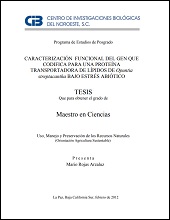Caracterización funcional del gen que codifica para una proteína transportadora de lípidos de Opuntia streptacantha bajo estrés abiótico
Resumen
El nopal crece en condiciones extremas de temperatura y disponibilidad de agua, por lo que posee mecanismos específicos para contrarrestar el estrés, entre ellos mecanismos moleculares que involucran la expresión de genes. Mediante un análisis de expresión de genes se encontró una proteína transportadora de lípidos que se induce por estrés abiótico. Las proteínas transportadoras de lípidos (LTPs) poseen la propiedad (in vitro) de transferir lípidos entre membranas, a pesar de muchos estudios no existen evidencias claras de una función biológica específica. Por lo que el objetivo del presente trabajo fue caracterizar funcionalmente en Arabidopsis thaliana el gen de una LTP de nopal en la respuesta a estrés abiótico. Para ello se transformaron levaduras con la construcción PYES 2.1::OpsLTP1 y se evaluó su respuesta al estrés salino (NaCl, 1.5 M), alcalino (Na2CO3, 37 mM) y estrés por congelamiento (-20°C, 48h). Igualmente se evaluó la función de AtLTP3 en plantas de A. thaliana, mediante el uso de una mutante insercional con pérdida de función (SALK_095248) y plantas sobre-expresantes con la construcción 35S 2X::OpsLTP1 (Over-OpsLTP1). Se evaluó la germinación, talla de la raíz, número de cotiledones verdes y recuperación en plántulas bajo estrés salino (NaCl) y osmótico (PEG-8000); para el caso de congelamiento (-20°C, 2h), se evaluó la recuperación en plántulas. Los resultados en levaduras mostraron diferencias significativas entre las levaduras control y las que tenían el gen de LTP en respuesta a NaCl (16 h) y Na2CO3 (8 y 16 h), sin embargo no se consideraron cambios biológicamente significativos debido a que la diferencia en las curvas de crecimiento fue pequeña. Las transformaciones genéticas de A. thaliana mostraron que la LTP está involucrada en los procesos de germinación, dado que se observó un aumento de 24.3% en la germinación de plantas Over-Ops-LTP1. Además la LTP está involucrada en la respuesta al estrés salino (NaCl) y osmótico (PEG), lo que se observó en plantas SALK que presentaron un retraso en germinación en presencia de NaCl (100 mM) a los días 5, 6, 7 y 9, así como por PEG (-0.57MPa) a los días 6, 8, 9, 10 y 11; A diferencia de ello, las Over-OpsLTP1 presentaron un incremento en la germinación en presencia de NaCl (100 mM) a los días 8, 9, 10 y 11, así como por PEG (-0.41MPa) a los días 5, 6, 7, 8, 9, 10 y 11 comparado con col-0 [...] Cactus pear grows in extreme temperature and water availability conditions so it has specific mechanisms to counteract stress, including molecular mechanisms involving gene expression. By analyzing gene expression we found a lipid transfer protein induced by abiotic stress. Lipid transfer proteins (LTPs) have the property (in vitro) of transporting lipids between membranes. Despite many studies, there is no clear evidence of a specific biological function yet. So the aim of this study was to characterize an LTP gene of cactus pear functionally in A. thaliana in response to abiotic stress. To accomplish this, we transformed yeasts with construction pYES2.1::OpsLTP1 and evaluated their response to salt (NaCl, 1.5 M), alkali (Na2CO3, 37 mM), and freezing stress (-20 °C, 48h). Also, we evaluated the role of AtLTP3 in A. thaliana plants by using insertional mutant plants lacking the function (SALK_095248) and in overexpression plants with the construction 2X 35S::OpsLTP1 (Over-OpsLTP1). We evaluated germination, root length, number of green cotyledons, and recovery in seedlings under salt (NaCl) and osmotic (PEG-8000) stress; in the case of freezing (-20 °C, 2h) stress, we assessed the recovery of seedlings. The results in yeast showed significant differences between control yeast and that with the LTP gene in response to NaCl (16 h) and Na2CO3 (8 and 16 h). However, we could not consider significant biological changes because the difference in growth curves was small. Genetic transformation of A. thaliana showed that LTP is involved in germination processes since there was an increase of 24.3% in plant germination Over-Ops-LTP1. Furthermore, the LTPs involved in salt (NaCl) and osmotic (PEG) stress responses, which were observed in SALK plants showing a germination delay in the NaCl (100 mM) at days 5, 6, 7, and 9, as well as by PEG (-0.57 MPa) at days 6, 8, 9, 10, and 11; in contrast, the Over OpsLTP1 showed an increase in germination in the presence of NaCl (100 mM) at days 8, 9, 10, and 11, as well as by PEG (-0.41 MPa) at days 5, 6, 7, 8, 9, 10, and 11 compared with Col-0 [...]

